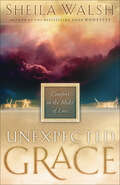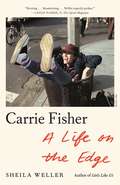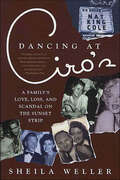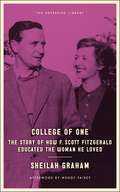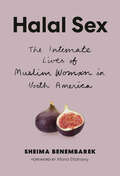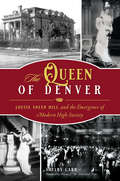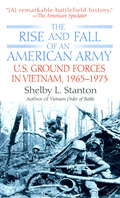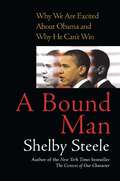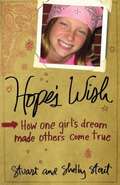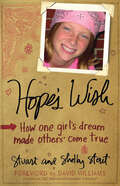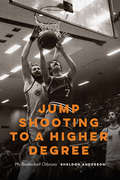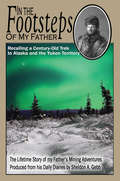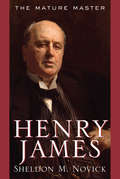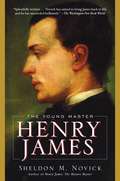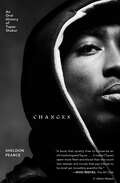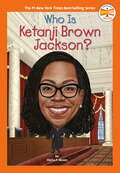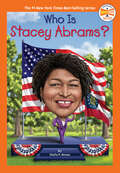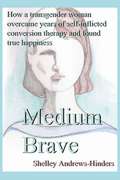- Table View
- List View
Loved Back to Life: How I Found the Courage to Live Free
by Sheila WalshJoin Sheila Walsh on her journey from despair to joy Beautiful and talented, Sheila Walsh was at the pinnacle of her career, appearing daily on television as cohost of The 700 Club. One day she found herself walking away from it all and checking in to a psychiatric hospital, where she stayed for a month. From the outside everything seemed fine, but on the inside Sheila was in trouble. In her journal she wrote, "Lord, please hold me. I'm falling into a dark well. I feel as if I am disappearing a little more every day. I am so angry inside that I am afraid of myself. I feel so alone." How did this happen? What brought her to her knees? Loved Back to Life takes readers on Sheila's journey of the soul from hopelessness to joy as she finds that although the road was scary, at every turn God beckoned her to follow and trust Him. And He did not let her down.
Unexpected Grace: Comfort in the Midst of Loss
by Sheila WalshWhen Eleanor Pfaehler and I met, we stood on opposite sides of an invisible, and seemingly insurmountable, wall," Sheila Walsh writes. "Eleanor and I talked over this wall. At times we reached up to hug. But the wall was always there."Then Eleanor was diagnosed with liver cancer. Finally, by the grace and mercy of God alone, the wall came crashing down. Eleanor and I found ourselves swimming in the river of mercy with our arms around each other, holding each other, willing to give our lives for each other."Unexpected Grace is a tender account of the relationship between a mother and daughter-in-law and how they discovered extravagant grace in the midst of what could have been the most tragic experience of their lives. Their story will encourage you and help you see how God can bring good out of even the bleakest circumstances.Previously published as Stories from the River of Mercy.
The Right to Be Cold: One Woman's Fight to Protect the Arctic and Save the Planet from Climate Change
by Sheila Watt-CloutierA &“courageous and revelatory memoir&” (Naomi Klein) chronicling the life of the leading Indigenous climate change, cultural, and human rights advocate For the first ten years of her life, Sheila Watt-Cloutier traveled only by dog team. Today there are more snow machines than dogs in her native Nunavik, a region that is part of the homeland of the Inuit in Canada. In Inuktitut, the language of Inuit, the elders say that the weather is Uggianaqtuq—behaving in strange and unexpected ways. The Right to Be Cold is Watt-Cloutier&’s memoir of growing up in the Arctic reaches of Quebec during these unsettling times. It is the story of an Inuk woman finding her place in the world, only to find her native land giving way to the inexorable warming of the planet. She decides to take a stand against its destruction.The Right to Be Cold is the human story of life on the front lines of climate change, told by a woman who rose from humble beginnings to become one of the most influential Indigenous environmental, cultural, and human rights advocates in the world. Raised by a single mother and grandmother in the small community of Kuujjuaq, Quebec, Watt-Cloutier describes life in the traditional ice-based hunting culture of an Inuit community and reveals how Indigenous life, human rights, and the threat of climate change are inextricably linked. Colonialism intervened in this world and in her life in often violent ways, and she traces her path from Nunavik to Nova Scotia (where she was sent at the age of ten to live with a family that was not her own); to a residential school in Churchill, Manitoba; and back to her hometown to work as an interpreter and student counselor. The Right to Be Cold is at once the intimate coming-of-age story of a remarkable woman, a deeply informed look at the life and culture of an Indigenous community reeling from a colonial history and now threatened by climate change, and a stirring account of an activist&’s powerful efforts to safeguard Inuit culture, the Arctic, and the planet.
Carrie Fisher: A Life On The Edge
by Sheila WellerA remarkably candid biography of the remarkably candid—and brilliant—Carrie FisherIn her 2008 bestseller, Girls Like Us, Sheila Weller—with heart and a profound feeling for the times—gave us a surprisingly intimate portrait of three icons: Carole King, Joni Mitchell, and Carly Simon. Now she turns her focus to one of the most loved, brilliant, and iconoclastic women of our time: the actress, writer, daughter, and mother Carrie Fisher. <P><P>Weller traces Fisher’s life from her Hollywood royalty roots to her untimely and shattering death after Christmas 2016. Her mother was the spunky and adorable Debbie Reynolds; her father, the heartthrob crooner Eddie Fisher. When Eddie ran off with Elizabeth Taylor, the scandal thrust little Carrie Frances into a bizarre spotlight, gifting her with an irony and an aplomb that would resonate throughout her life. We follow Fisher’s acting career, from her debut in Shampoo, the hit movie that defined mid-1970s Hollywood, to her seizing of the plum female role in Star Wars, which catapulted her to instant fame. We explore her long, complex relationship with Paul Simon and her relatively peaceful years with the talent agent Bryan Lourd. We witness her startling leap—on the heels of a near-fatal overdose—from actress to highly praised, bestselling author, the Dorothy Parker of her place and time. <P><P>Weller sympathetically reveals the conditions that Fisher lived with: serious bipolar disorder and an inherited drug addiction. Still, despite crises and overdoses, her life’s work—as an actor, a novelist and memoirist, a script doctor, a hostess, and a friend—was prodigious and unique. As one of her best friends said, “I almost wish the expression ‘one of a kind’ didn’t exist, because it applies to Carrie in a deeper way than it applies to others.” <P><P>Sourced by friends, colleagues, and witnesses to all stages of Fisher’s life, Carrie Fisher: A Life on the Edge is an empathic and even-handed portrayal of a woman who—as Princess Leia, but mostly as herself—was a feminist heroine, one who died at a time when we need her blazing, healing honesty more than ever.
Dancing at Ciro's: A Family's Love, Loss, and Scandal on the Sunset Strip
by Sheila Weller"Poignant memoir of a not-so-typical New York Jewish family’s experiences in the midcentury Hollywood demimonde … Equal parts emotional tissue-party and shrewd cultural history." - Kirkus ReviewsIn 1958, young Sheila Weller was living a charmed life with her family in Beverly Hills. Her father was a brilliant brain surgeon. Her mother was a movie-magazine writer whose brother owned Hollywood's most dazzling nightclub, Ciro's. Then her world exploded after she witnessed her uncle's brutal attempt to kill her father.In Dancing at Ciro's, Weller has written a deeply felt memoir of her family's life contrasted with those most glamorous days of Hollywood's forties and fifties. While vividly describing Lana Turner's, Frank Sinatra's, and Sammy Davis Jr.'s evenings--and breakdowns--at Ciro's, Weller casts a keen eye on her own family's turmoil and loss.
Girls Like Us: Carole King, Joni Mitchell, Carly Simon and the Journey of a Generation
by Sheila WellerBiographies of 3 top female singers of the 1960s.
Girls Like Us: Carole King, Joni Mitchell, Carly Simon--And the Journey of a Generation
by Sheila WellerA groundbreaking and irresistible biography of three of America&’s most important musical artists—Carole King, Joni Mitchell, and Carly Simon—charts their lives as women at a magical moment in time.Carole King, Joni Mitchell, and Carly Simon remain among the most enduring and important women in popular music. Each woman is distinct. Carole King is the product of outer-borough, middle-class New York City; Joni Mitchell is a granddaughter of Canadian farmers; and Carly Simon is a child of the Manhattan intellectual upper crust. They collectively represent, in their lives and their songs, a great swath of American girls who came of age in the late 1960s. Their stories trace the arc of the now mythic sixties generation—female version—but in a bracingly specific and deeply recalled way, far from cliché. The history of the women of that generation has never been written—until now, through their resonant lives and emblematic songs. Filled with the voices of many dozens of these women's intimates, who are speaking in these pages for the first time, this alternating biography reads like a novel—except it’s all true, and the heroines are famous and beloved. Sheila Weller captures the character of each woman and gives a balanced portrayal enriched by a wealth of new information. Girls Like Us is an epic treatment of midcentury women who dared to break tradition and become what none had been before them—confessors in song, rock superstars, and adventurers of heart and soul.
The News Sorority
by Sheila Weller"Weller rivetingly recounts these gutsy ladies' time on the front lines... an inspiration for future generations of journalists." --Vanity Fair For decades, women battered the walls of the male fortress of television journalism. After fierce struggles, three women--Diane Sawyer, Katie Couric, and Christiane Amanpour--broke into the newsroom's once impenetrable "boys' club." These extraordinary women were not simply pathbreakers, but wildly gifted journalists whose unique talents--courage and empathy, competitive drive and strategic poise--enabled them to climb to the top of the corporate ladder and transform the way Americans received their news. Drawing on exclusive interviews with their colleagues and intimates from childhood on, The News Sorority crafts a lively and exhilarating narrative that reveals the hard struggles and inner strengths that shaped these women and powered their success. Life outside the newsroom--love, loss, child rearing--would mark them all, complicating their lives even as it deepened their convictions and instincts. Life inside the newsroom would include many nervy decisions and back room power plays previously uncaptured in any media account. Taken together, Sawyer's, Couric's, and Amanpour's lives as women are here revealed not as impediments but as keys to their success. Raised in Louisville, Kentucky, Diane Sawyer was a young woman steering her own unique political course in a time of societal upheaval. Her fierce intellect, almost insuperable work ethic, and sophisticated emotional intelligence would catapult Sawyer from being the first female on-air correspondent for 60 Minutes, to early on interviewing the likes of Boris Yeltsin and Michael Jackson, to presenting heartbreaking specials on child poverty in America while anchoring the network flagship ABC World News. From her first breaks as a reporter all the way through her departure in 2014, Sawyer's charisma and drive would carry her through countless personal and professional changes. Katie Couric, always conveniently underestimated because of her "girl-next-door" demeanor, brazened her way through a succession of regional TV news jobs until she finally hit it big. In 1991, Couric became the tremen-dously popular cohost of Today, where, over the next fifteen years, she transformed the "female" slot from secondary to preeminent while shouldering devastating personal loss and launching an audacious and lifesaving public health campaign. Couric's greatest triumph--and most bedeviling challenge--was inheriting the mantle of Walter Cronkite at CBS Evening News, as the first woman to solo-anchor a prestigious nighttime network news program. Through it all, her contradictions--she's wry and sarcastic yet sensitive; seriously feminist while proudly sorority-girlish--made her beyond easy typecasting, and as original as she is relatable. A glamorous, unorthodox cosmopolite--the daughter of a British Catholic mother and an Iranian Muslim father, raised in pre-revolution Iran amid royalty and educated in England--Christiane Amanpour was an elite, wily, charis¬matic convent-school girl who would never have been picked out of a lineup as a future war reporter, until her character flourished on catastrophic soil: her family's exile during the Iranian Revolution. Once she knew her calling, Amanpour shrewdly made a virtue of her outsider status, joining the fledgling CNN on the bottom rung and then becoming its "face," catalyzing its rise to global prominence. Amanpour's fearlessness in war zones, and before presidents and despots, would make her the world's witness to some of its most acute crises and television's chief advocate for international justice. Revealing the tremendous combination of ambition, empathy, and skill that empowered Sawyer, Couric, and Amanpour to reach stardom, The News Sorority is at once a detailed story of three very particular lives and a testament to the extraordinary character of women everywhere.
The News Sorority
by Sheila Weller"Weller rivetingly recounts these gutsy ladies' time on the front lines... an inspiration for future generations of journalists." --Vanity FairFor decades, women battered the walls of the male fortress of television journalism. After fierce struggles, three women--Diane Sawyer, Katie Couric, and Christiane Amanpour--broke into the newsroom's once impenetrable "boys' club." These women were not simply pathbreakers, but wildly gifted journalists whose unique talents enabled them to climb to the top of the corporate ladder and transform the way Americans received their news.Drawing on exclusive interviews with their colleagues and intimates from childhood on, The News Sorority crafts a lively and exhilarating narrative that reveals the hard struggles and inner strengths that shaped these women and powered their success. Life outside the newsroom--love, loss, child rearing--would mark them all, complicating their lives even as it deepened their convictions and instincts. Life inside the newsroom would include many nervy decisions and back room power plays previously uncaptured in any media account. Taken together, Sawyer's, Couric's, and Amanpour's lives as women are here revealed not as impediments but as keys to their success.Raised in Louisville, Kentucky, Diane Sawyer was a young woman steering her own unique political course in a time of societal upheaval. Her fierce intellect, almost insuperable work ethic, and sophisticated emotional intelligence would catapult Sawyer from being the first female on-air correspondent for 60 Minutes, to presenting anchoring the network flagship ABC World News. From her first breaks as a reporter all the way through her departure in 2014, Sawyer's charisma and drive would carry her through countless personal and professional changes.Katie Couric, always conveniently underestimated because of her "girl-next-door" demeanor, brazened her way through a succession of regional TV news jobs until she finally hit it big. In 1991, Couric became the cohost of Today, where, over the next fifteen years, she transformed the "female" slot from secondary to preeminent while shouldering devastating personal loss. Couric's greatest triumph--and most bedeviling challenge--was at CBS Evening News, as the first woman to solo-anchor a nighttime network news program. Her contradictions--seriously feminist while proudly sorority-girlish--made her beyond easy typecasting, and as original as she is relatable.A glamorous, unorthodox cosmopolite--raised in pre-revolution Iran amid royalty and educated in England--Christiane Amanpour would never have been picked out of a lineup as a future war reporter, until her character flourished on catastrophic soil: her family's exile during the Iranian Revolution. Once she knew her calling, Amanpour shrewdly made a virtue of her outsider status, joining the fledgling CNN on the bottom rung and then becoming its "face," catalyzing its rise to global prominence. Amanpour's fearlessness in war zones would make her the world's witness to some of its most acute crises and television's chief advocate for international justice.Revealing the tremendous combination of ambition, empathy, and skill that empowered Sawyer, Couric, and Amanpour to reach stardom, The News Sorority is a detailed story of three very particular lives and a testament to the extraordinary character of women everywhere.From the Trade Paperback edition.a thing that may be a dying, rapidly changing art form, but it's definitely still going to need voices and faces and intelligence giving out the news no matter how much our socially gadget-manipulated changing world changes. There will always be stars and TV has had them in spades... This is a terrific book. I marked mine so many times, it is virtually unreadable. Believe me, if you like history and gossip and believe, like I do, that gossip IS history -- you will love reading about the big three." New York Daily News "This immensely readable book made headlines before publication for its irresistible gossip. It is dishy, but it's also a close up and very perso...
College of One: The Story of How F. Scott Fitzgerald Educated the Woman He Loved (Neversink)
by Sheilah Graham Wendy W. FaireyThe moving story of how F. Scott Fitzgerald--washed up, alcoholic and ill--dedicated himself to devising a heartfelt course in literature for the woman he loved.In 1937, on the night of her engagement to the Marquess of Donegall, Sheilah Graham met F. Scott Fitzgerald at a party in Hollywood. Graham, a British-born journalist, broke off her engagement, and until Fitzgerald had a fatal heart attack in her apartment in 1940, the two writers lived the fervid, sometimes violent affair that is memorialized here with unprecedented intimacy. When they met, Fitzgerald's fame had waned. He battled crippling alcoholism while writing screenplays to support his daughter and institutionalized wife. Graham's star, however, was rising, to the point where she became Hollywood's highest-paid, best-read gossip columnist. But if Fitzgerald had lived out his "crack-up" in public, Graham kept her demons secret--such as that she believed herself to be "a fascinating fake who pulled the wool over Hollywood's eyes.'' Most poignantly, she keenly felt her lack of education, and Fitzgerald rose to the occasion. He became her passionate tutor, guiding her through a curriculum of his own design: a college of one. Graham loved him the more for it, writing the book as a tribute. As she explained, "An unusual man's ideas on what constituted an education had to be preserved. It is a new chapter to add to what is already known about an author who has been microscopically investigated in all the other areas of his life."From the Trade Paperback edition.
Halal Sex: The Intimate Lives of Muslim Women in North America
by Sheima BenembarekAn unprecedented glimpse into the sex lives of female and gender-expansive Muslims living across Canada and the United States.In the Muslim world, sex is permissible (or halal) only within the confines of marriage. Outside of wedlock, the act is considered haram, a sin of the faith. Girls are taught to protect their virginity; their mothers, if not forgoing &“the talk&” altogether, obscure the facts with elliptical language and metaphors.So, what happens when immigrants and the children of immigrants set about pursuing an open and active sex life on a more sexually liberated continent, amid western peers and attitudes? The six deeply personal stories in Halal Sex attempt to answer this question, bringing a hushed conversation out into the open.Within these pages you&’ll meet Azar, a non-binary trans Sufi; Bunmi, a Nigerian navigating shame and Tinder; Eman, a lesbian stand-up comic in an interfaith marriage; Taslim, a virgin in her forties struggling to erect healthy boundaries; and Khadijah, an exotic dancer and sex worker.With great empathy, Sheima Benembarek makes space for the honesty and vulnerability of each participant and handles their stories with gentleness and care. What emerges is a tapestry of a diverse Islam—encompassing a wide variety of cultural and religious and socioeconomic backgrounds—and a frank, feminist contribution to the advancement of Muslim sexual education and pleasure.
The Queen of Denver: Louise Sneed Hill and the Emergence of Modern High Society (American Heritage)
by Shelby CarrFor more than four decades at the turn of the century, Louise Sneed Hill ruled over Denver's high society with her southern charm, societal tact and passion for success. Hill created a society group dubbed the "Sacred Thirty-Six" and held parties that encouraged animal dances, roller skating and alcohol consumption. She fashioned herself to the public as a hardworking, self-made woman. She used the press to sell her image, emphasize amusement and aid in her mission to transform society from Victorian morality to unabashed fun. She pushed boundaries at a time when American society was unsure of its social direction. Historian Shelby Carr delves into the complex story of the highly mythicized, misrepresented and misunderstood Mrs. Crawford Hill.
The Rise and Fall of an American Army
by Shelby L. Stanton“THE MEN WHO SACRIFICED FOR THEIR COUNTRY ARE RIGHTFULLY HERALDED . . . This is an honest book–one well worth reading. . . . Stanton has laid his claim to the historian’s ranks by providing his reader with well-documented, interpretive assessments. ” –Parameters The Vietnam War remains deep in the nation’s consciousness. It is vital that we know exactly what happened there–and who made it happen. This book provides a complete account of American Army ground combat forces–who they were, how they got to the battlefield, and what they did there. Year by year, battlefield by battlefield, the narrative follows the war in extraordinary, gripping detail. Over the course of the decade, the changes in fighting and in the combat troops themselves are described and documented. The Rise and Fall of an American Armyrepresents the first total battlefield history of Army ground forces in the Vietnam War, containing much previously unreleased archival material. It re-creates the feel of battle with dramatic precision. “Stanton’s writing . . . gives the reader a terrifying graphic description of combat in the many mini-environments of Vietnam. ” –TheNew York Times “[A] MOVING, IMPORTANT BOOK. ” –St. Louis Post-Dispatch
A Bound Man
by Shelby SteeleIn Shelby Steele's beautifully wrought and thoughtprovoking new book, A Bound Man, the award-winning and bestselling author of The Content of Our Character attests that Senator Barack Obama's groundbreaking quest for the highest office in the land is fast becoming a galvanizing occasion beyond mere presidential politics, one that is forcing a national dialogue on the current state of race relations in America. Says Steele, poverty and inequality usually are the focus of such dialogues, but Obama's bid for so high an office pushes the conversation to a more abstract level where race is a politics of guilt and innocence generated by our painful racial history -- a kind of morality play between (and within) the races in which innocence is power and guilt is impotence. Steele writes of how Obama is caught between the two classic postures that blacks have always used to make their way in the white American mainstream: bargaining and challenging. Bargainers strike a "bargain" with white America in which they say, I will not rub America's ugly history of racism in your face if you will not hold my race against me. Challengers do the opposite of bargainers. They charge whites with inherent racism and then demand that they prove themselves innocent by supporting black-friendly policies like affirmative action and diversity. Steele maintains that Senator Obama is too constrained by these elaborate politics to find his own true political voice. Obama has the temperament, intelligence, and background -- an interracial family, a sterling education -- to guide America beyond the exhausted racial politics that now prevail. And yet he is a Promethean figure, a bound man. Says Steele, Americans are constrained by a racial correctness so totalitarian that we are afraid even to privately ask ourselves what we think about racial matters. Like Obama, most of us find it easier to program ourselves for correctness rather than risk knowing and expressing what we truly feel. Obama emerges as a kind of Everyman in whom we can see our own struggle to accept and honor what we honestly feel about race. In A Bound Man, Steele makes clear the precise constellation of forces that bind Senator Obama, and proposes a way for him to break these bonds and find his own voice.The courage to trust in one's own careful judgment is the new racial progress, the "way out" from the forces that now bind us all.
Hope's Wish: How One Girl's Dream Made Others' Come True
by Stuart Stout Shelby StoutOne courageous girl used her final wish to fulfill the wishes of 155 other children. When Hope Stout was diagnosed with bone cancer, the Stouts prayed for a miracle. The miracle occurred, but not in the way the Stouts expected. Instead this young girl asked for what seemed to be impossible--that one million dollars be raised in a month to fund the wishes of all the children on the Make-A-Wish Foundation's list for Central and Western North Carolina. Shelby and Stuart Stout felt led to write A Legacy of Hope after compiling a journal of the 191 days from Hope's diagnosis to her death. Both parents were with Hope every step of the way on her journey from a healthy preteen to being dependent on crutches to eventually being bedridden. Their heartfelt story includes the times when they were angry and desperate, as well as the times when Hope's humor and spirit shone through.
Hope's Wish: How One Girl's Dream Made Others' Come True
by Stuart Stout Shelby StoutOne courageous girl used her final wish to fulfill the wishes of 155 other children. When Hope Stout was diagnosed with bone cancer, the Stouts prayed for a miracle. The miracle occurred, but not in the way the Stouts expected. Instead this young girl asked for what seemed to be impossible-that one million dollars be raised in a month to fund the wishes of all the children on the Make-A-Wish Foundation's list for Central and Western North Carolina.Shelby and Stuart Stout felt led to write A Legacy of Hope after compiling a journal of the 191 days from Hope's diagnosis to her death. Both parents were with Hope every step of the way on her journey from a healthy preteen to being dependent on crutches to eventually being bedridden. Their heartfelt story includes the times when they were angry and desperate, as well as the times when Hope's humor and spirit shone through.Academy Award winning screen writers Diana Ossana and Larry McMurtry are developing the screenplay for Hope&’s Wish with an expected production date sometime in 2013.
Jump Shooting to a Higher Degree: My Basketball Odyssey
by Sheldon AndersonJump Shooting to a Higher Degree chronicles Sheldon Anderson&’s basketball career from grade school in small-town Moorhead, Minnesota, in the 1960s, to inner-city high school and college ball in Minneapolis, to a professional career in West Germany, and finally to communist Poland, where he did PhD research while on a basketball junket behind the Iron Curtain in the late 1980s. Because he was the only American player in the league at the time, and with help from a Polish scholar, Anderson was one of the first Western scholars to gain access to Communist Party documents. He's also likely the only American scholar to have funded his research by playing semi-pro basketball in a communist country.Jump Shooting to a Higher Degree is much more than a basketball story. Anderson provides insights into the everyday lives of people behind the Iron Curtain, such as the English coach he played for in West Germany, an elderly woman he visited many times in East Germany, and a sailmaker&’s family he lived with in Warsaw. He reflects on German, Polish, and Cold War history, providing a commentary on the times and the places where he lived and played, and the importance of basketball along the way.
In The Footsteps of My Father: Recalling a Century-Old Trek to Alaska and the Yukon Territory
by Sheldon GebbLive life in the Alaska and the Yukon more than one hundred years ago through my father's diary, which details the hard work, frustrations and horseplay in the development of Guggenheim's mammoth gold dredge mining operation. Ponder his decision to quit a comfortable job as a mining engineer to venture 60 miles east of Dawson City with the King of the Klondike to endure, without fear, the coldest winter on record averaging minus 50 degrees. Question through his words the unsuccessful digging of a mine shaft through frozen ground ending with the comment, "April Fool's Day. We're down 160 feet in the shaft and no gold. April Fools proper-that is what we are. We are up against the fact we can remain no longer. We have no grub." Experience his comical adventures as a bear hunter finally giving up to seek employment at the Kennecott Copper Mine; electing to cross the largest ice fields in North America alone, guided by instinct, with only a woman's robe and a tarp for warmth.
Henry James: The Mature Master
by Sheldon M. NovickThe New York Times compared Sheldon M. Novick&’s Henry James: The Young Master to &“a movie of James&’s life, as it unfolds, moment to moment, lending the book a powerful immediacy.&” Now, in Henry James: The Mature Master, Novick completes his super, revelatory two-volume account of one of the world&’s most gifted and least understood authors, and of a vanished world of aristocrats and commoners. Using hundreds of letters only recently made available and taking a fresh look at primary materials, Novick reveals a man utterly unlike the passive, repressed, and privileged observer painted by other biographers. Henry James is seen anew, as a passionate and engaged man of his times, driven to achieve greatness and fame, drawn to the company of other men, able to write with sensitivity about women as he shared their experiences of love and family responsibility. James, age thirty-eight as the volume begins, basking in the success of his first major novel, The Portrait of a Lady, is a literary lion in danger of being submerged by celebrity. As his finances ebb and flow he turns to the more lucrative world of the stage–with far more success than he has generally been credited with. Ironically, while struggling to excel in the theatre, James writes such prose masterpieces as The Wings of the Dove and The Golden Bowl. Through an astonishingly prolific life, James still finds time for profound friendships and intense rivalries. Henry James: The Mature Master features vivid new portraits of James&’s famous peers, including Edith Wharton, Oscar Wilde, and Robert Louis Stevenson; his close and loving siblings Alice and William; and the many compelling young men, among them Hugh Walpole and Howard Sturgis, with whom James exchanges professions of love and among whom he thrives. We see a master converting the materials of an active life into great art. Here, too, as one century ends and another begins, is James&’s participation in the public events of his native America and adopted England. As the still-feudal European world is shaken by democracy and as America sees itself endangered by a wave of Jewish and Italian immigrants, a troubled James wrestles with his own racial prejudices and his desire for justice. With the coming of world war all other considerations are set aside, and James enlists in the cause of civilization, leaving his greatest final works unwritten. Hailed as a genius and a warm and charitable man–and derided by enemies as false, effeminate, and self-infatuated–Henry James emerges here as a major and complex figure, a determined and ambitious artist who was planning a new novel even on his deathbed. In Henry James: The Mature Master, he is at last seen in full; along with its predecessor volume, this book is bound to become the definitive biography. NOTE: This edition does not include a photo insert.
Henry James: The Young Master
by Sheldon M. NovickAs if Henry James himself were guiding us, we visit old Calvinist New York in the mid-nineteenth century, and share the coming-of-age of a young man whose boldness of spirit and profound capacity for affection attract both men and women to him. We journey with James through Italy and France, witness his first love affair in Paris, and settle with him in London at the height of Empire in the Victorian Age. We scale the heights of London society with him, and as the world opens to James we share with him the experience of writing a series of celebrated and successful novels, culminating with Washington Square (on which the play The Heiress is based) and his masterpiece The Portrait of a Lady. The Washington Post Book World notes: "It is no small ambition to write a biography of James that is commensurate with that master, and Sheldon Novick has done it." "Splendidly written . . . Novick has aimed to bring James back to life and he has succeeded brilliantly." -The Washington Post Book World "Like a movie of James's life, as it unfold moment to moment." -The New York Times "Masterful in bringing James and his world to life." -San Francisco Examiner-Chronicle "Beautifully written, with a grace that enables [Sheldon Novick] to weave his subject's words in and out of his own with a properly Jamesian suavity . . . Novick's account gives one a profound respect for James's persistence and power of will." -The New RepublicNOTE: This edition does not include a photo insert.
Changes: An Oral History of Tupac Shakur
by Sheldon PearceA New Yorker writer&’s intimate, revealing account of Tupac Shakur&’s life and legacy, timed to the fiftieth anniversary of his birth and twenty-fifth anniversary of his death.In the summer of 2020, Tupac Shakur&’s single &“Changes&” became an anthem for the worldwide protests against the murder of George Floyd. The song became so popular, in fact, it was vaulted back onto the iTunes charts more than twenty years after its release—making it clear that Tupac&’s music and the way it addresses systemic racism, police brutality, mass incarceration, income inequality, and a failing education system is just as important now as it was back then. In Changes, published to coincide with the fiftieth anniversary of Tupac&’s birth and twenty-fifth anniversary of his death, Sheldon Pearce offers one of the most thoughtful and comprehensive accounts yet of the artist&’s life and legacy. Pearce, an editor and writer at The New Yorker, interviews dozens who knew Tupac throughout various phases of his life. While there are plenty of bold-faced names, the book focuses on the individuals who are lesser known and offer fresh stories and rare insight. Among these are the actor who costarred with him in a Harlem production of A Raisin in the Sun when he was twelve years old, the high school drama teacher who recognized and nurtured his talent, the music industry veteran who helped him develop a nonprofit devoted to helping young artists, the Death Row Records executive who has never before spoken on the record, and dozens of others. Meticulously woven together by Pearce, their voices combine to portray Tupac in all his complexity and contradiction. This remarkable book illustrates not only how he changed during his brief twenty-five years on this planet, but how he forever changed the world.
Who Is Ketanji Brown Jackson? (Who HQ Now)
by Shelia P. Moses Who HQDiscover how a young girl who was the star of her school's debate team became a federal jurist and the first Black woman to sit on the United States Supreme Court.Presenting Who HQ Now: an exciting addition to the #1 New York Times Best-Selling Who Was? series!Born in Washington, DC, in 1970, and raised in Miami, Florida, Ketanji Brown Jackson developed an interest in law and politics at an early age. As a preschooler, she sat with her father and watched him complete his law school assignments. And even though some people, including a school guidance counselor, discouraged Ketanji from aiming high, she proved them wrong and graduated with honors from Harvard Law School. She went on to serve on the U.S. District Court in 2013 and the United States Court of Appeals in 2021 before making history and becoming the first Black woman to be confirmed to the United States Supreme Court in 2022.Learn more about Ketanji Brown Jackson's story in this addition to the New York Times bestselling series.
Who Is Stacey Abrams? (Who HQ Now)
by Shelia P. Moses Who HQDiscover how a young girl who loved to read and write became a voting rights activist, a candidate for governor of Georgia, and an author in this exciting addition to the Who HQ Now series that features newsmakers and trending topics.Presenting Who HQ Now: an exciting addition to the #1 New York Times Best-Selling Who Was? series!Stacey Abrams began her career in politics at the age of seventeen when she was hired as a typist for a congressional campaign. From there, she worked hard to get into Yale law school and, eventually, was elected into the House of Representatives. In 2018, she became the first Black woman in the United States to be a major party's nominee for governor when she was selected as the Democratic candidate. Although she didn't win that race, she decided to run again in 2022, proving that she never backs down from a challenge. Stacey made it her mission to help ensure that all people who are eligible have the right and ability to vote. Her Fair Fight Action organization helps prevent voter suppression across the country. When she was growing up, Stacey was taught three important principles by her parents: go to school, go to church, and take care of each other. And these are the same beliefs she holds today.
Love in a Headscarf
by Shelina JanmohamedWhen Shelina Janmohamed, an Oxford-educated Muslim living in the bubbling ethnic mix of North London, opted for the traditional "arranged" route to finding a partner, she never suspected it would be the journey of her life. Through ten long years of matchmaking buxom aunties, countless mismatches, and outrageous dating disasters, Shelina discovers more about herself and her faith. Along the way, she learns that sometimes being true to her religion means challenging tradition, while readers learn much about Islam that may surprise them.
Medium Brave: How a Transgender Woman Overcame Years of Self-Imposed Conversion Therapy and Found True Happiness
by Shelley Andrews-HindersMedium Brave is the poignant story of what it was like growing up transgender in 1950s Ohio--the challenges, the confusion, the struggle of growing up different twenty years before the term that defines that condition has even been created. Told with gentle humor, insight, and heartbreaking honesty, Medium Brave will touch the heart, inspire the mind, and encourage any soul still struggling with their authenticity and freedom to find out what it means to be medium brave.

